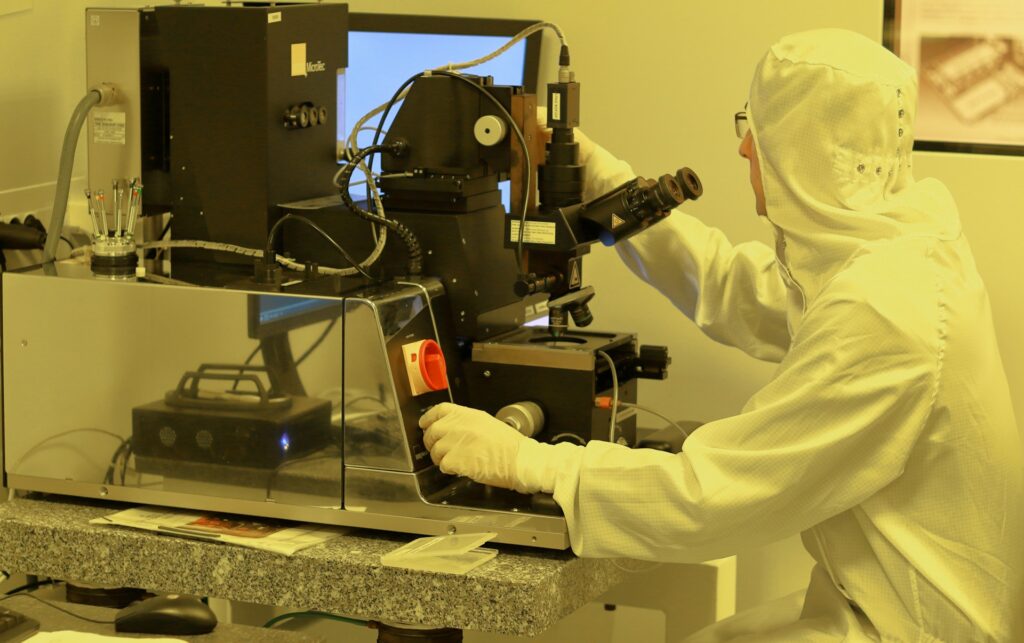Advantages and Disadvantages of Nanotechnology In 2024

Introduction
Step into the realm where science converges with innovation, and the infinitesimal holds monumental power. Welcome to the captivating universe of nanotechnology, where atoms dance to orchestrate marvels beyond imagination. In this introductory odyssey, we embark on a journey to unravel the mysteries and unveil the marvels of the nano-scale world. Prepare to be enthralled as we navigate through the intricate tapestry of atoms and molecules, discovering the profound advantages of nanotechnology that promise to reshape industries and redefine possibilities.
Yet, amidst the splendor, we confront the shadows; the lurking disadvantages of nanotechnology whisper caution amidst the awe. Join us as we delve deep into this captivating realm, igniting curiosity, stirring fascination, and paving the path to a future where the minuscule reigns supreme. Embark on this voyage with us, where knowledge sparks inspiration and action shapes destiny.
Table of Contents
Definition of Nanotechnology

Nanotechnology is the science of manipulating matter at the atomic and molecular scale, typically between 1 and 100 nanometers. At this minuscule scale, materials exhibit unique properties that differ significantly from their bulk counterparts, enabling advancements in various fields such as medicine, electronics, and energy. The essence of nanotechnology lies in its ability to design and create materials with novel functions, driven by the peculiar behaviors of atoms and molecules.
However, it is crucial to acknowledge the disadvantages of nanotechnology, including potential environmental and health risks. Due to their small size, nanoparticles can penetrate biological systems, potentially causing unforeseen toxic effects. This dual nature of nanotechnology—its vast potential and inherent risks—demands careful consideration and rigorous research to fully harness its benefits while mitigating its drawbacks.
Estimates of the Global Nanotechnology Market’s Value

The global nanotechnology market is witnessing unprecedented growth, underscoring its transformative potential across various industries. In 2020, the market was valued at approximately $1.76 billion. However, projections suggest a remarkable surge, with the market anticipated to reach an astounding $33.63 billion by 2030. This exponential growth is driven by the increasing integration of nanotechnology in sectors such as healthcare, electronics, energy, and materials science.
Healthcare applications, including targeted drug delivery systems and advanced diagnostic tools, are significant contributors to this growth. In electronics, the development of nanoscale transistors and sensors is revolutionizing device miniaturization and performance. Additionally, nanotechnology is paving the way for breakthroughs in renewable energy, with innovations in solar panels and battery technology enhancing efficiency and sustainability.
Investment in nanotechnology research and development by both private enterprises and governments worldwide is a crucial factor fueling this market expansion. However, as the market grows, it is essential to address the ethical, environmental, and health implications associated with the widespread use of nanomaterials. By navigating these challenges, the global nanotechnology market is poised to achieve its projected value, driving technological advancements that will redefine our future.
Advantages of Nanotechnology
The advantages of nanotechnology are profound and far-reaching, revolutionizing numerous sectors with its innovative applications. Here are some of the key benefits:
- Medical Advancements: Nanotechnology enables the creation of highly targeted drug delivery systems, ensuring medications are delivered directly to diseased cells, minimizing side effects and improving treatment efficacy. Additionally, nanoscale diagnostic tools can detect diseases at their earliest stages, facilitating prompt and effective interventions.
- Enhanced Materials: The manipulation of matter at the nanoscale allows for the development of materials with unprecedented properties. These materials are often stronger, lighter, and more durable than their traditional counterparts. For instance, carbon nanotubes are significantly stronger than steel yet much lighter, finding applications in aerospace, construction, and sports equipment.
- Environmental Impact: Nanotechnology offers solutions for environmental challenges by improving energy efficiency and reducing waste. Nanomaterials are used to create more efficient solar panels and batteries, contributing to the advancement of renewable energy technologies. Additionally, nanotechnology can aid in water purification and pollution reduction by developing advanced filtration systems and catalysts.
- Electronics and Computing: The miniaturization of electronic components through nanotechnology leads to faster, more efficient, and compact devices. Nanoscale transistors and sensors enhance the performance of computers, smartphones, and other electronic devices, driving the evolution of the digital age.
- Agricultural Innovations: Nanotechnology plays a crucial role in improving agricultural productivity and sustainability. Nanoparticles can be used to deliver nutrients and pesticides more efficiently, reducing the overall amount needed and minimizing environmental impact. Furthermore, nanosensors can monitor soil health and crop conditions in real-time, enabling precision farming techniques that enhance yield and reduce resource usage.
- Textile Industry: Nanotechnology is transforming the textile industry by creating fabrics that are stain-resistant, waterproof, and antimicrobial. Nanofibers can be incorporated into clothing to provide additional functionality, such as temperature regulation and UV protection, without compromising comfort or style.
- Energy Storage and Conversion: Nanotechnology advances in energy storage and conversion are pivotal for the development of next-generation batteries and fuel cells. Nanomaterials improve the capacity and efficiency of these devices, leading to longer-lasting batteries for electric vehicles and portable electronics, and more efficient fuel cells for clean energy applications.
- Cosmetics and Personal Care: The cosmetics industry benefits from nanotechnology through the development of products with enhanced absorption and effectiveness. Nanoparticles in sunscreens provide better UV protection without leaving a white residue, and nanocarriers in skincare products ensure deeper penetration of active ingredients, improving their efficacy.
Disadvantages of Nanotechnology
While nanotechnology holds immense promise, it also presents several significant drawbacks. Here are some key disadvantages of nanotechnology:
- Health Risks: Nanoparticles can easily penetrate biological membranes, potentially accumulating in organs and tissues. This could lead to unforeseen toxicological effects, with long-term health impacts that remain largely unknown. Comprehensive studies are essential to understand these risks fully.
- Environmental Impact: The persistence of nanomaterials in the environment raises concerns about bioaccumulation and ecological disruption. These materials can affect flora and fauna in unpredictable ways, posing potential hazards to ecosystems.
- Economic Costs: The development and implementation of nanotechnology require substantial financial investment. High costs associated with research, specialized equipment, and production processes can limit accessibility and adoption, particularly in less developed regions.
- Ethical Concerns: The rapid advancement of nanotechnology introduces ethical dilemmas related to privacy and security. Nanoscale devices could be used for surveillance without consent, leading to significant privacy infringements.
- Regulatory Challenges: Existing regulatory frameworks may be inadequate for addressing the unique risks posed by nanomaterials. Developing comprehensive guidelines and safety protocols is crucial to ensure responsible usage and mitigate potential hazards.
- Social Implications: Nanotechnology may exacerbate existing social inequalities, as access to advanced technologies and benefits may be unevenly distributed. This could widen the gap between socioeconomic classes and exacerbate disparities in healthcare, education, and employment opportunities.
- Unintended Consequences: The complexity of nanoscale interactions introduces the risk of unforeseen consequences. Nanomaterials may interact with biological systems in unexpected ways, leading to unintended health effects or environmental impacts that are difficult to anticipate or mitigate.
- Technological Dependency: As society becomes increasingly reliant on nanotechnology, there is a risk of technological dependency. Relying heavily on nanoscale materials and devices could leave society vulnerable to disruptions in supply chains or technological failures, with potentially far-reaching consequences.
Conclusion
In conclusion, while the advantages of nanotechnology hold great promise for revolutionizing various industries, it is crucial to acknowledge and address the potential disadvantages of nanotechnology. The transformative potential of nanotechnology in fields such as medicine, electronics, and energy is undeniable, offering solutions to complex challenges and driving innovation. However, concerns regarding health risks, environmental impacts, and ethical considerations must not be overlooked. A balanced approach that combines rigorous research, effective regulation, and ethical oversight is essential to maximize the benefits of nanotechnology while mitigating its risks. By fostering responsible innovation and addressing societal concerns, we can harness the full potential of nanotechnology to create a brighter and more sustainable future for all.
Frequently Asked Questions (FAQ) about Nanotechnology
Q1: What are the main advantages of nanotechnology?
Nanotechnology offers numerous benefits across various industries. Some key advantages include enhanced medical treatments through targeted drug delivery, more efficient electronics and computing devices, improved materials with superior strength and durability, and advancements in renewable energy technologies.
Q2: What are the potential disadvantages of nanotechnology?
Despite its benefits, nanotechnology also poses certain risks and challenges. Common disadvantages include health risks associated with nanoparticle exposure, environmental impacts due to the persistence of nanomaterials, high economic costs of research and development, ethical concerns regarding privacy and security, and regulatory challenges in ensuring safe usage and oversight.
Q3: How does nanotechnology impact healthcare?
Nanotechnology has revolutionized healthcare by enabling precise drug delivery systems, early disease detection through nanoscale diagnostics, and the development of innovative medical devices with enhanced capabilities. These advancements offer potential solutions for complex medical challenges and improve patient outcomes.
Q4: Are there any ethical considerations related to nanotechnology?
Yes, ethical considerations in nanotechnology include concerns about privacy infringement through nanoscale surveillance devices, equitable access to nanotechnology benefits across different socioeconomic groups, and the potential for unintended consequences or misuse of nanomaterials.
Q5: What role does nanotechnology play in environmental sustainability?
Nanotechnology contributes to environmental sustainability through innovations such as more efficient energy storage and conversion devices, advanced water purification systems, and eco-friendly materials with reduced environmental impact. These applications help address environmental challenges and promote sustainable development.





Hello! I just wanted to say how much I appreciated this blog post. Your writing is always so engaging and informative. It’s clear that you have a deep understanding of the subject matter. Thank you for sharing your expertise with us. Looking forward to your next post!
Greetings! I found this blog post to be incredibly informative and well-written. Your ability to break down complex topics into easy-to-understand language is truly a gift. Thank you for sharing your knowledge with us. I’m excited to read more of your posts in the future!